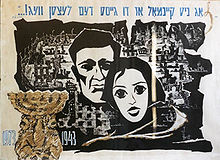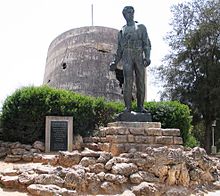This is an old revision of this page, as edited by ~riley (talk | contribs) at 13:40, 30 April 2012 (Undid revision 489949531 by 72.10.121.49 (talk)). The present address (URL) is a permanent link to this revision, which may differ significantly from the current revision.
Revision as of 13:40, 30 April 2012 by ~riley (talk | contribs) (Undid revision 489949531 by 72.10.121.49 (talk))(diff) ← Previous revision | Latest revision (diff) | Newer revision → (diff)| Mordechai Anielewicz | |
|---|---|
 Mordechaj Anielewicz Mordechaj Anielewicz | |
| Nickname(s) | "Little Angel" (Aniołek) |
| Born | 1919 Wyszków, Second Polish Republic |
| Died | 1943 Warsaw, General Government |
| Allegiance | Jewish Combat Organization |
| Rank | Commander |
| Battles / wars | Warsaw Ghetto Uprising |
| Awards | Cross of Valour, Cross of Grunwald |
Mordechai Anielewicz (1919 – 8 May 1943) was the leader of Żydowska Organizacja Bojowa (Template:Lang-en), also known as ŻOB, during the Warsaw Ghetto Uprising from January to May 1943.
Biography
Anielewicz was born into a poor family in the small town of Wyszków near Warsaw. After he completed his high school studies, he joined and became a leader of the "Hashomer Hatzair", the Zionist-socialist youth movement.
On 7 September 1939, a week after the German invasion of Poland, Anielewicz escaped with a group from Warsaw to the east of the country in the hopes that the Polish Army would slow down the German advance. When the Soviet Red Army invaded and then occupied Eastern Poland in accordance with the Molotov–Ribbentrop Pact, Anielewicz heard that Jewish refugees, other youth movement members and political groups had flocked to Vilna, Lithuania, which was then under Soviet control. He travelled to Vilna and attempted to convince his colleagues to send people back to Poland to continue the fight against the Germans. He then attempted to cross the Romanian border in order to open a route for young Jews to get to the Mandate of Palestine, but was caught and thrown into a Soviet jail. He was released a short time later, and returned to Warsaw in January 1940 with his girlfriend, Mira Fuchrer.


In the summer of 1942 Anielewicz visited the southwest region of Poland – annexed to Germany – attempting to organize armed resistance. Upon his return to Warsaw, he found that a major deportation to the Treblinka extermination camp had been carried out and only 60,000 of the Warsaw Ghetto's 350,000 Jews remained. He soon joined the ŻOB, and in November 1942 he was appointed as the group's chief commander. A connection with the Polish government in exile in London was made and the group began receiving weapons from the Polish underground on the "Aryan" side of the city. On 18 January 1943, Anielewicz was instrumental in the first act of the Warsaw Ghetto Uprising, preventing the majority of a second wave of Jews from being deported to extermination camps. This initial incident of armed resistance was a prelude to the Warsaw Ghetto Uprising that commenced on 19 April.
Though there were no surviving eyewitnesses, it is assumed that he took his own life on 8 May 1943, along with his girlfriend and many of his staff, in a mass suicide at the surrounded ŻOB command post at 18 Miła Street. His body was never found and it is generally believed that it was carried off to nearby crematoria along with those of all the other Jewish dead; nevertheless, the inscription on the memorial at the site of the Miła 18 bunker states that he is buried there.
Honors


In July 1944 Anielewicz was posthumously awarded the Cross of Valour by the Polish government in exile. In 1945 he was also awarded the Cross of Grunwald, 3rd Class by the Polish People's Army.
During the later part of the war a unit of the People's Guard formed from Warsaw Ghetto survivors bore the name of Anielewicz. In December 1943 kibbutz Yad Mordechai in Israel was renamed after him and had a monument erected in his memory. There are also memorials for him in Wyszków and in Warsaw, where in the 1960s Gęsia Street, site of a former German concentration camp, was renamed Mordechaj Anielewicz Street. In 1983, 40 years after their deaths, the Israeli government issued a two-stamp set honoring Anielewicz and Josef Glazman as heroes of the Warsaw and Vilna ghettos.
In popular culture
The actor Murray Salem played Anielewicz in the 1978 television miniseries Holocaust, while Hank Azaria played the role in the 2001 television film Uprising. Anielewicz is also a key figure in Harry Turtledove's alternate history series Worldwar and appears as a character in the Highlander 1997 novel Zealot. In the role-playing game Wraith: The Oblivion, he is the de-facto leader of the Shadowlands version of the Warsaw Ghetto. In Leon Uris's 1961 novel Mila 18, the protagonist Andrei Androfsky is modeled on Anielewicz.
Sources
- Edelman, Marek, and Krall, Hanna. Shielding the Flame: An Intimate Conversation With Dr. Marek Edelman, the Last Surviving Leader of the Warsaw Ghetto Uprising. Henry Holt and Company, New York, 1986
- Zuckerman, Yitzhak, A Surplus of Memory: Chronicle of the Warsaw Ghetto Uprising (A Centennial Book), ISBN 0-520-07841-1
References
- Zertal, Idith (2005). Israel's Holocaust and the Politics of Nationhood. Cambridge University Press. p. 27. ISBN 9780521850964.
- "The Holocaust". Boeliem:The Complete Reference to Israeli Stamps from 1948 and Onwards. 3 January 2009. Retrieved 11 May 2010.
External links
- Mordecai Anielewicz at the Jewish Virtual Library
- Mordecai Anielewicz (Polish hero) -- Britannica Online Encyclopedia
- 1919 births
- 1943 deaths
- Jewish resistance members
- Military personnel who committed suicide
- People from Wyszków County
- Polish Jews
- Polish resistance fighters of World War II
- Recipients of the Virtuti Militari
- Recipients of the Cross of Valour (Poland)
- Recipients of the Cross of Grunwald
- Suicides in Poland
- People who died in the Warsaw Ghetto